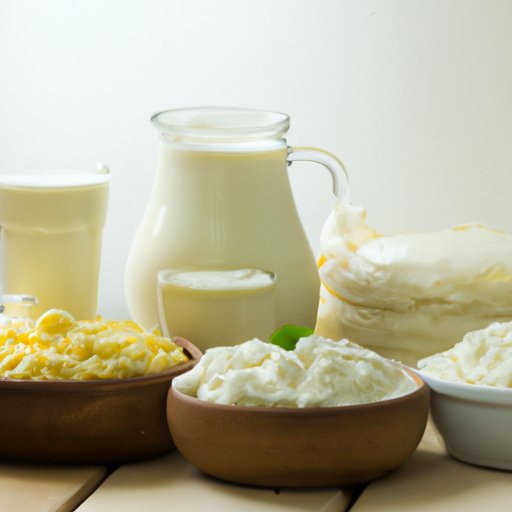Introduction
Cultured dairy products are food items made from milk that have been fermented with bacteria or yeast. These products have been around for centuries and are enjoyed by people all over the world as part of a healthy diet. There are many benefits to adding cultured dairy products to your diet, including improved digestion, reduced risk of disease, and strengthened immune system.

Exploring Different Types of Cultured Dairy Products
There are several different types of cultured dairy products that you can choose from. Here is an overview of some of the most popular options.
Yogurt
Yogurt is one of the most popular cultured dairy products. It’s made by fermenting milk with specific strains of bacteria, such as Lactobacillus bulgaricus and Streptococcus thermophilus. It has a thick, creamy texture and comes in a variety of flavors. It can be eaten plain or used as an ingredient in recipes.
Kefir
Kefir is another type of cultured dairy product. It’s made by fermenting milk with a combination of yeast and bacteria. It has a tart flavor and a thin, watery consistency. It contains beneficial probiotics and can be consumed plain or incorporated into smoothies and other recipes.
Cheese
Cheese is another type of cultured dairy product. It’s made by curdling milk with enzymes or acids, then aging it until it develops its characteristic texture and flavor. There are many different types of cheese, ranging from soft and mild to sharp and pungent.
Sour Cream
Sour cream is a type of cultured dairy product made by fermenting cream with lactic acid bacteria. It has a thick, creamy texture and a tangy flavor. It can be used as a topping for baked potatoes, added to dips and sauces, or enjoyed on its own.

Health Benefits of Eating Cultured Dairy Products
In addition to being delicious, cultured dairy products also offer a number of health benefits. Here are a few of the most notable ones.
Improved Digestion
Eating cultured dairy products can help improve digestion. The beneficial bacteria found in these products help break down food more efficiently, which leads to better nutrient absorption and less gastrointestinal discomfort. Regularly eating cultured dairy products can also help reduce symptoms associated with digestive disorders such as irritable bowel syndrome (IBS).
Reduced Risk of Disease
Regularly eating cultured dairy products can help reduce the risk of certain diseases. Studies have shown that these products may lower cholesterol levels, reduce inflammation, and even protect against cancer. Additionally, the probiotics found in these products can help balance the gut microbiome, which is important for overall health.
Strengthened Immune System
Eating cultured dairy products can also help strengthen the immune system. The probiotics found in these products can help reduce inflammation and fight off harmful bacteria and viruses. Additionally, the calcium and vitamin D found in these products can help keep bones strong and support a healthy immune system.
Making Cultured Dairy Products at Home
Making cultured dairy products at home can be a fun and rewarding experience. Here is an overview of the process.
Equipment and Ingredients Needed
To make cultured dairy products at home, you’ll need a few basic pieces of equipment and ingredients. You’ll need a pot, a stirring utensil, a container for fermentation (such as a mason jar), and a strainer. As far as ingredients go, you’ll need some type of dairy (such as milk, cream, or yogurt) and a starter culture (such as kefir grains or yogurt starter).
Step-by-Step Instructions
The first step is to heat the dairy to the desired temperature. This will kill any harmful bacteria and help the starter culture thrive. Next, add the starter culture and stir to combine. Once everything is combined, transfer the mixture to a container and cover it loosely with a lid. Allow the mixture to ferment for the recommended amount of time (usually between 12 and 24 hours). Finally, strain the mixture through a fine mesh strainer and enjoy!

Finding the Best Quality Cultured Dairy Products
When shopping for cultured dairy products, it’s important to look for the highest quality products available. Here are a few tips to help you do just that.
Reading Labels for Quality and Nutrition Information
When shopping for cultured dairy products, it’s important to read labels carefully. Look for products that contain only natural ingredients and no added sugars or preservatives. Also, check the nutrition facts panel for information about fat content, calories, and other nutrients.
Knowing Where to Look for High Quality Products
Look for products that are certified organic or made with grass-fed dairy. You can also check local farmer’s markets or specialty stores for high quality products. Additionally, many grocery stores now carry a wide selection of cultured dairy products.
Making Informed Choices
When shopping for cultured dairy products, it’s important to make informed choices. Read labels carefully and don’t be afraid to ask questions. Pay attention to the ingredients, nutrition information, and where the product was sourced from. This will help ensure that you’re getting the highest quality product possible.
Conclusion
Cultured dairy products are a delicious and nutritious way to add variety to your diet. They offer numerous health benefits, including improved digestion, reduced risk of disease, and strengthened immune system. If you want to get the most out of these products, it’s important to look for the highest quality products available. Additionally, you can try making your own cultured dairy products at home.
(Note: Is this article not meeting your expectations? Do you have knowledge or insights to share? Unlock new opportunities and expand your reach by joining our authors team. Click Registration to join us and share your expertise with our readers.)
